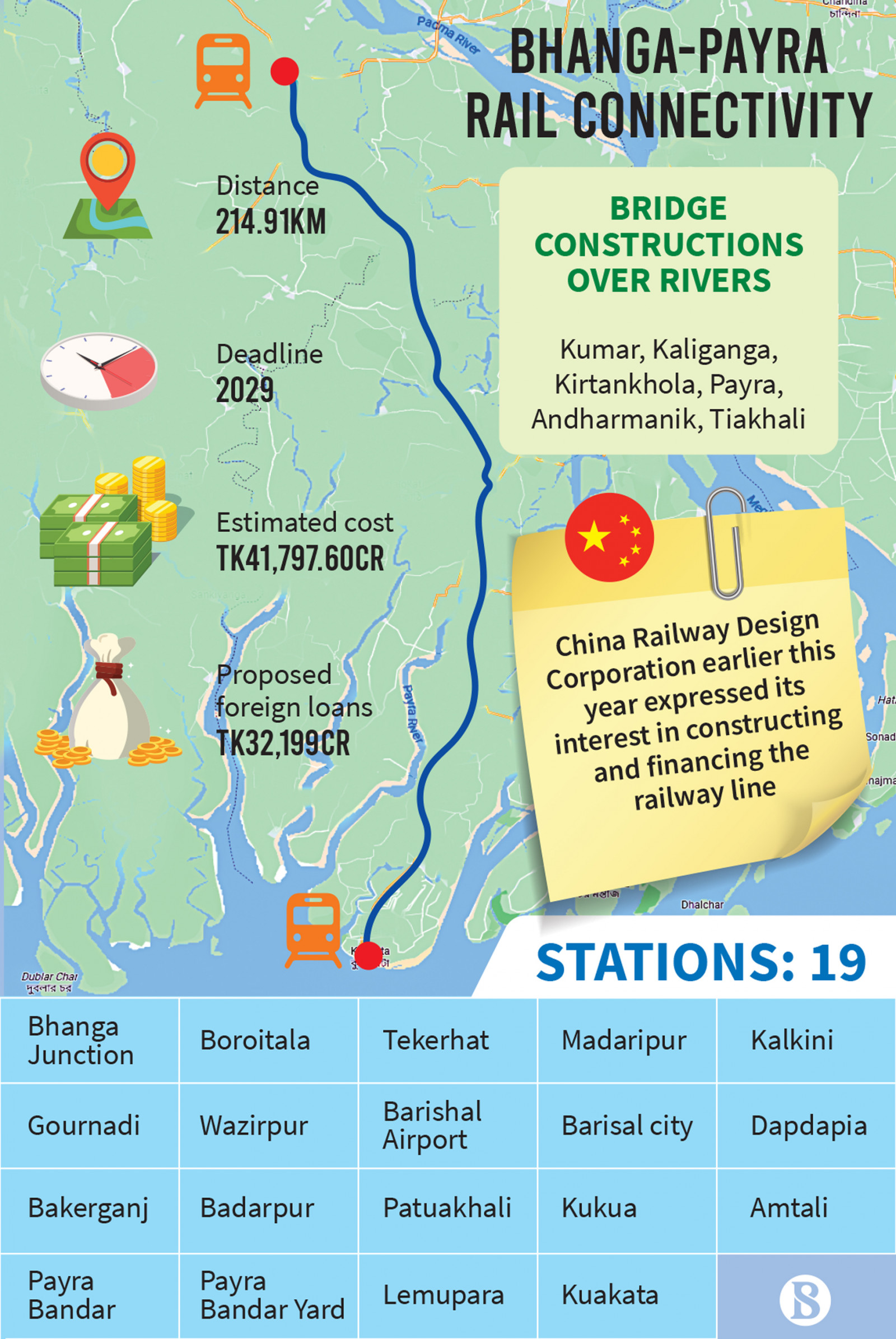Bhanga-Barishal-Payra rail line: Govt to submit proposal for Chinese loan
The 214.91-kilometre rail network is expected to unlock the vast economic potential of the region by boosting connectivity between the capital and the southern districts of Barishal

The government is set to submit a formal proposal to China, seeking a loan for the construction of a broad gauge rail line from Faridpur's Bhanga to Payra seaport in Patuakhali via Barishal, a crucial step towards integrating the South into the expanding railway network and optimising the advantages of the Padma Bridge.
Once completed, the 214.91-kilometre rail network is expected to unlock the vast economic potential of the region by boosting connectivity between the capital and the southern districts of Barishal, according to officials at the Bangladesh Railway.
Professor Shamsul Hoque of the Bangladesh University of Engineering and Technology (Buet) said the introduction of new infrastructure to an underdeveloped region holds great potential. However, the focus should primarily be on freight transportation. Otherwise, this substantial investment may not yield significant returns from passenger services.
"According to the final survey report of Payra Port, its success depends on interlink connectivity. Along with the rail link, a dedicated freight corridor should also be established with the port," he told The Business Standard.
The transport expert said a special economic zone is also being developed next to Payra Port, with many more development projects underway in the Patuakhali-Barishal region. These projects include coal-fired power plants.
"Payra Port is expected to be profitable for handling certain captive cargo. Additionally, establishing interlink connectivity in the form of multimodal transportation is essential. This requires the establishment of rail, road, and river connections. Consequently, the port will require rail connectivity to ensure its viability," he added.
In April 2022, the government sent a proposal to various development agencies, seeking financing for the project. However, there has been no response for nearly a year and a half.
However, state-owned China Railway Design Corporation earlier this year expressed its interest in constructing and financing the railway line and also made a presentation in this regard at the Railway Bhaban, said SM Salimullah Bahar, chief planning officer of the Bangladesh Railway.
Based on this, a letter has been sent to the Economic Relations Division (ERD) to initiate discussions with the Chinese authorities.
According to a three-year survey conducted by the railway authorities, the project will cost Tk41,797.60 crore, and Tk32,199 crore has been proposed to be financed from foreign loans.
"The ERD, as the government's responsible institution for foreign debt, will make the final decision after reviewing the loan conditions and other issues," said the chief planning officer.
ERD officials said necessary measures will be taken after reviewing the proposal.
According to the proposal, the Chinese company will jointly arrange finance for the network and also conduct engineering, procurement, and construction along with its partner, China Harbour Engineering Company Limited.
As per the proposal from the Chinese company to the Bangladesh Railway, the loan will be repaid in 30 years. The grace period will be seven years, with an interest rate of around 2%.
Yunus Mohammad, a senior research fellow at the Bangladesh Institute of Development Studies, said the master plan for railways includes a proposal to construct railways in the Barishal region. However, this plan could not be implemented due to various reasons.
He said that, usually, projects of this magnitude are financed by development partners. Loans are often sought from these partners to support a variety of projects. Many projects, however, do not receive prioritisation from the government for a range of reasons. This can stem from pressure exerted by influential individuals or political considerations.
"As a result, it is evident that loans are being acquired for rural development projects rather than railway projects. Some railway projects remain stagnant for prolonged periods despite initial efforts, primarily due to their lack of prioritisation on the list of important initiatives," he added.
Railway officials said the feasibility study for constructing the railway line was concluded in June last year. Nevertheless, even as the study reached its final stages, a preliminary development project proposal was forwarded to different partner agencies through the ERD for funding.
The railway authorities have set a goal to complete the construction of the 214.91-kilometre rail line by 2029.
This rail route will have 19 stations in Bhanga Junction, Boroitala, Tekerhat, Madaripur, Kalkini, Gournadi, Wazirpur, Barishal Airport, Barishal City, Dapdapia, Bakerganj, Badarpur, Patuakhali, Kukua, Amtali, Payra Bandar, Payra Bandar Yard, Lemupara, and Kuakata.
Officials said the railway line will require the construction of bridges over the Kumar, Kaliganga, Kirtankhola, Payra, Andharmanik, and Tiakhali rivers.
According to railway sources, UK-based IM Power Plc had earlier offered to invest in this rail line's construction. Australian company Providus Investments had also expressed interest in this project, but their interest did not last long.



 Keep updated, follow The Business Standard's Google news channel
Keep updated, follow The Business Standard's Google news channel















